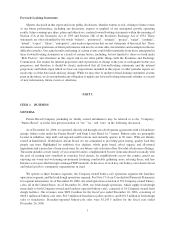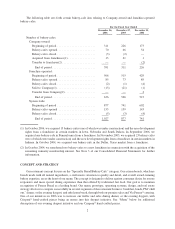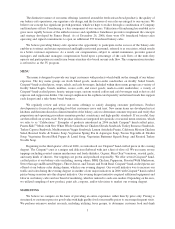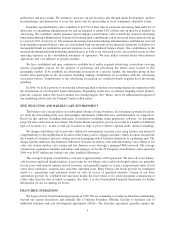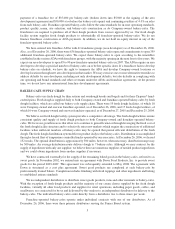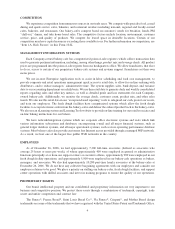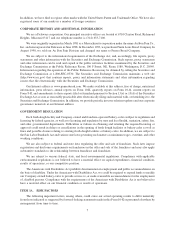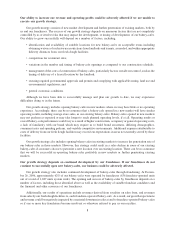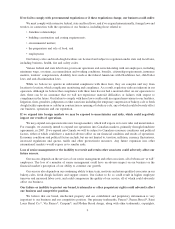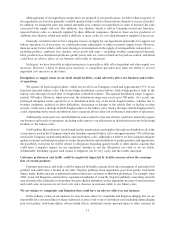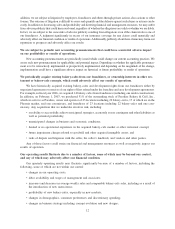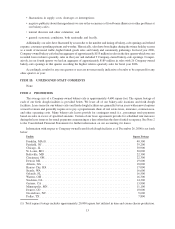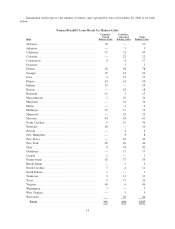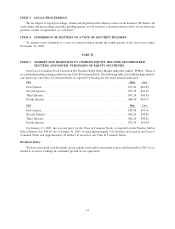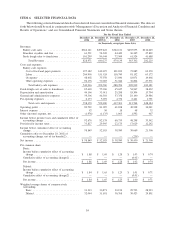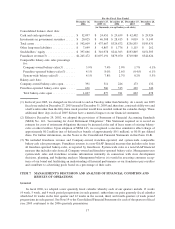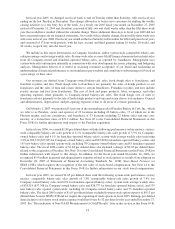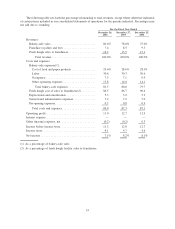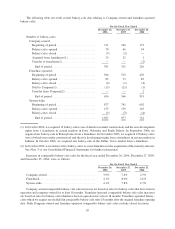Panera Bread 2006 Annual Report Download - page 16
Download and view the complete annual report
Please find page 16 of the 2006 Panera Bread annual report below. You can navigate through the pages in the report by either clicking on the pages listed below, or by using the keyword search tool below to find specific information within the annual report.Although many of our ingredients and products are prepared to our specifications, we believe that a majority of
the ingredients are based on generally available products that could be obtained from alternative sources if needed.
In addition, we frequently enter into annual and multi-year contracts for ingredients in order to decrease the risks
associated with supply and cost. The antibiotic free chicken, which is sold in Company-owned and franchise-
operated bakery-cafes, is currently supplied by three different companies. However, there are few producers of
antibiotic free chicken, which may make it difficult, or more costly, for us to find alternative suppliers if necessary.
Generally, we believe that we have adequate sources of supply for our ingredients and products to support our
bakery operations or, if necessary, we could make menu adjustments to address material supply issues. However,
there are many factors which could cause shortages or interruptions in the supply of our ingredients and products —
including produce, antibiotic free chicken, sweet goods and soup — including weather, unanticipated demand,
labor, production or distribution problems, quality issues and cost, some of which are beyond our control, and which
could have an adverse affect on our business and results of operations.
In the past, we have been able to adjust menu prices to partially or fully offset ingredient and other supply cost
increases. However, a delay in menu price increases or competitive pressures may limit our ability to recover
ingredient cost increases in the future.
Disruptions or supply issues in our fresh dough facilities, could adversely affect our business and results
of operations.
We operate 18 fresh dough facilities, which service all of our Company-owned and approximately 97% of our
franchise-operated bakery-cafes. The fresh dough distribution system delivers fresh dough products daily to the
bakery-cafes through a leased fleet of temperature controlled vehicles. The optimal distribution range is approx-
imately 300 miles. However, when necessary, the distribution range may reach up to 500 miles. As a result, any
prolonged disruption in the operations of or distribution from any of the fresh dough facilities, whether due to
weather conditions, technical or labor difficulties, destruction or damage to the vehicle fleet or facility or other
reasons, could cause a shortage of fresh dough products at the bakery-cafes. Such a shortage of fresh dough products
could, depending on the extent and duration, have a material adverse affect on our business and results of operations.
Additionally, increased costs and distribution issues related to fuel and utilities could also materially impact
our business and results of operations, including with respect to our efficiencies in distribution from our fresh dough
facilities to the bakery-cafes.
Our Franklin, Massachusetts’ fresh dough facility manufactures and supplies through our distributors all of the
cream cheese used in the Company-owned and franchise-operated bakery cafes and approximately 79% of the tuna
used in the Company-owned and franchise-operated bakery-cafes. Although we believe we have adopted adequate
quality assurance and other procedures to ensure the production and distribution of quality products and ingredients,
the possibility exists that we will be subject to allegations regarding quality, health or other similar concerns that
could have a negative impact on our operations whether or not the allegations are valid or we are liable.
Additionally, defending against such claims or litigation can be very costly and the results uncertain.
Customer preferences and traffic could be negatively impacted by health concerns about the consump-
tion of certain products.
Customer preferences and traffic could be impacted by health concerns about the consumption of particular food
products and could cause a decline in our sales. Negative publicity about ingredients, poor food quality, food-borne
illness, injury, health concerns or nutritional content could cause customers to shift their preferences. For example, since
2004, Asian and European countries have experienced outbreaks of avian flu. Negative publicity concerning avian flu
may adversely affect demand for our products because chicken and turkey are key ingredients in many of our menu items
and could cause an increase in our food costs and a decrease in customer traffic to our bakery-cafes.
We are subject to complaints and litigation that could have an adverse affect on our business.
In the ordinary course of our business we may become subject to complaints and litigation alleging that we are
responsible for a customer illness or injury suffered at or after a visit to one of our bakery-cafes including claims alleging
poor food quality, food-borne illness, adverse health effects, nutritional content, personal injury or other concerns. In
11


